#the general theme of his character is existence entirely on one's own terms. and by proxy. death by one's own terms as well
Explore tagged Tumblr posts
Text
WHAT IS PECULIAR ABOUT YOUR SOUL?


Your soul is... Volatile
There is a deep, painful energy harbored within this soul... At its very core festers malice, and a deeply rooted pain that craves nothing more but to inflict itself onto everything around it. Special care has been given to it- to stop examiners from coming into any harm should they draw too near to it. You coil like a serpent, awaiting a moment to strike. To claim your revenge. It never comes.

Tagged by: @vilestblood 💕
Tagging: @vhgr (any) @chateautangerine @monstriiss @princguard @freak1ish @grownpale (any) @kurjaks @maramcna and you! 🫵
#i got this one once and ancient twice which is a pretty good set of results#put this one since the quiz talks about death a whole lot anyway and death is something this mfer has successfully avoided for millenia#and#this perfectly encapsulates the concept of Nik Actually Dying. he would simply remain. stay vengeful. continue to cause harm#the general theme of his character is existence entirely on one's own terms. and by proxy. death by one's own terms as well#and now i'm thinking about if he were to be /killed/ (near impossible as it is) would he truly achieve freedom after death in any capacity.#and no. he wouldn't. he would continue on to become a haunting. dig his fingers into the plane of the living and remain out of spite alone#He Decides When He's Done#on the other hand yeah some parts apply Generally. he can be malicious and often.. but certainly not cartoon villain levels so#but the serpent theme fits ✨️🐍#𝐓𝐇𝐄 𝐍𝐄𝐂𝐑𝐎𝐌𝐀𝐍𝐂𝐄𝐑 ‒ nikodemus ║ DASH GAMES
11 notes
·
View notes
Text
Brave Bang Bravern!: A Review for Transformers Fans
I've seen so much about this on my dash that I had to give it a try, and I gotta say, as someone who hasn't watched any new anime series since around 2008 at the most recent and I also hate the fucking military, this is a pretty good show.
THERE WILL BE SOME MILD SPOILERS. Nothing major. I'm not gonna spoil anything critical or mention characters that are introduced later etc. At of time of writing, only 6 episodes have been released.
Understanding Genre: The Trailer is A Lie
Now, while there is a trailer here, I want you to largely disregard it.
Why is that? Well, we need to talk about the "big two" robot show genres in Japan, which are as follows:
Real Robot -- This refers to a typically military setting or other serious setting, in which robots are handled as realistically as possible in terms of how they work and how they are applied. There tend to be less individual/sentient robots and more "suit" type mechs right along side human-made, more realistic machinery and mech designs, although that isn't entirely unique to this genre. Usually this stuff is labelled as sci-fi/action outside of Japan.
Super Robot (THIS IS THE SHIT TRANSFORMERS FANS GENERALLY WANT) --Essentially borderline seemingly magical robots with their own rules and in universe backstory for how they work, which isn't necessarily tied to realism. Usually this stuff is labelled as sci-fi/fantasy or space fantasy outside of Japan, since a lot of these tend to be space robots. They can be "driven" by pilots or just straight up sentient robots who are vibing with some human companions, although it's not exclusively that. It can be both, it can be neither, but no matter what, Super Robot shows are less about strict realism and more about really cool shit with robots that are basically their own people and exist according to their own rules.
Now, the trailer for BBBB (the acronym for the show is based on the Japanese title, which is Bang Brave Bang Bravern) is a COMPLETE FUCKING LIE.
It wants you to think this is going to be some dumbass GI Joe shit.
While there are elements of dumbass GI Joe shit, this is largely just to set up the premise for why shit is happening in the first place, and to help introduce the main threat (alien space creatures with fucking light beam lasers) as well as bring in our main characters under the premise of everyone having to work together to address this alien threat to Earth.
What we care about here amongst Transformers freaks is gay space robots, and this show delivers.
Getting Into Bravern: First Episode, Mild Plot Spoiler Summary
It wants you to think this is a Real Robot show.
The first episode sets things up as though it will be a Real Robot show.
There is a threat to Earth, a mystery space alien mechanical enemy, and nobody knows what the fuck to do. A military exercise between multiple nations using Titanostriders (which look very much like Shiro Masamune Appleseed-style mechs, human made in nature) to practice battle drills who are now instructed to swap over to real ammunition and go to fucking town.
Nobody knows how to do that.
They're skilled with the Titanostriders, sure, but it turns into a shit show. The alien mechanical enemies are using fucking space laser shit, it's a disaster---
--And then Bravern drops in from the fucking sky and it IMMEDIATELY TURNS INTO A SUPER ROBOT SHOW.
There's a "get in the robot, Shiji" moment where one of the Titanostrider operators, Isami Ao, is encouraged by Bravern to get inside of him.
He does. And immediately has no idea what the fuck is going on, Bravern is largely in control, and starts to blast his own theme song inside his cockpit as diegetic music while Isami is generally losing his shit, as one might do.
Humanity's reaction to Bravern is Real Robot genre type, where it is handled seriously by all the characters and organisations involved in universe, however Bravern is very much a Super Robot genre character who brings more of a Super Robot energy to the show at large.
The serious elements are mostly balanced by how fucking silly Bravern is, and there are some excellent moments in this show (currently only 6 episodes have been released) which make it entirely worth a watch.
Fun Things About Bravern Himself
Braven is very, very, very gay for his pilot.
Chances are, you've seen the screenshots of some of these moments on Tumblr already, but the delivery of these lines is magnificent.
Bravern sings his own theme song. It's the voice actor for Bravern doing the vocals, and the song itself is reminiscent of 1970s orchestrated big band energy mecha themes. For Transformers fans, it has a very Transformers Victory theme kind of vibe to it.
You gotta hear it, it fucking rules. The album cover shows Bravern holding a giant microphone.
Bravern is generally light hearted, doing his best to motivate his pilot while not hesitating to enter the action and try to defend humanity.
Now, why does Bravern care about humans so much? We don't know, but we'll talk about some mysteries in a later section below.
He is surprisingly insightful at times, while also fucking around and enjoying himself. (You may have seen screenshots going around Tumblr of Bravern with a loop of hot dogs strung around one of his chevron points on his forehead. This follows a scene in which he wants his pilot to take a break and associate with his peers for once, as a way to relieve stress. So they go to a bar, it turns out reception is positive and someone even brings weenies out for Bravern since he's too big to fit inside, lol.)
Generally, he's a very interesting mech, because we have so little information about him. He's fun, and clearly vibing, but he's also borderline if not outright obsessed with his pilot and has unknown origins, which has lead to some darker interpretations and audience discussion.
A lot of people have compared Bravern's energy to Rodimus, and generally I would agree with that. He has his high-energy silly moments, and his more serious personal moments (primarily with Isami, but also with Smith), and I think these aspects of his character work well to create a fun mech with the potential to be deep in a believable and effective way, with an equal capacity for being a doofus.
Bravern is obviously the number one reason to watch the show for most people, and I would say that if you're purely here for a giant gay space robot, then this is going to be a decent watch.
The Military Sucks: There Are Militaries Involved Yet Somehow This Is Still Watchable
I hate the fucking military, so at least the military here is depicted in an acceptable way (so far, at least). In episode 2, they waterboard Isami to interrogate him for information he doesn't have regarding Bravern, which is a realistically shitty and awful thing for the military to do-- They don't sugarcoat how fucked up the military is. These people very much have the capacity to harm their own staff, and they will do so if it means they might get an edge over the enemy.
At the same time, the actual characters in the military are depicted as primarily doing this shit out of a genuine personal desire to defeat these horrendously destructive space entities, which have attacked at least some of their home towns and home countries, so it's more personal rather than purely being a military directive that people are being forced to follow.
In this way, it's not really realistic, but everyone is on board for their own largely humanitarian aid type of reasons (there is a mission which is basically just locating survivors of an attack and then getting the fuck out) which makes the military context feel less oppressive and shitty.
Part of why this is more OK than other military depictions is because the military forces involved here are international (collaborating to defeat a global threat rather than kill each other's civilians) and because the military is clearly losing this war.
Because it's an international effort, this brings more diversity to the show-- There's a surprising amount of English interspersed between dialogue in Japanese here and there, and the military board consists of representatives from multiple nations, including some Germans who at first believe Bravern is some kind of secret American operation, lmao.
Bravern calls the military out on its shit, and essentially tells the military board to stop with the suspicious infighting bullshit and drop the internal tension because otherwise they'll all die to this mechanical nightmare creature threat.
They actually listen, which means this is an unrealistic portrayal of the military, lmao. I think they struck a good balance so far between showing that the military sucks and has problems, while also making sure that you're not really cheering for any given military force, but rather, you cheer for individual characters who just happen to be stuck doing this military shit as a premise for anything to be going on in the show at all.
So it's not the worst when it comes to the military shit; At least so far, it's watchable, which as someone who passionately hates the fucking military, is surprising to me.
It's less GI Joe and more "we just needed a reason for these characters to be involved in this situation".
Of course, your mileage may vary, but personally I found it easy to tune out or just skip through any military shit that got grating and I didn't miss anything important by doing so. At the very least, you can skip around and ignore a lot of this stuff and get right to the gay robot if that's all you want to do. It becomes clear pretty quickly what's going on if you skip around a bit, so no worries there.
Fun Speculation: What is Bravern?
Only 6 episodes are out at the moment, so there's tons of shit we don't know yet.
Bravern has a notable resemblance to a type of enemy in the show, called a Death-Drive.
Death-Drives are mecha who are distinct from the "minion" type enemies (which almost resemble flying saucers with laser gun arms and light shields), and have their own unique character designs and names.
Why these things are here, how they are here, why they are interested in Earth, and everything else is currently unknown.
Bravern looks like he could possibly be of the same mechanical species, although we don't know if that's true (yet). He has abilities that the other mecha don't seem to have, but how far this goes and what it might mean is not yet clear.
Bravern also seems to have knowledge of human media (he references The Abyss at one point and he likes 3D printing figures of sentai show characters lmao), and was immediately able to speak to the humans using language they would understand, so it's unclear if Bravern may have been studying Earth for some time before his arrival or why.
He is obsessed with his pilot and cares for him so much that he extends some care towards others purely based on their relation to Isami as co-workers; Why? What makes Isami special?
How does Bravern know seemingly every human language? How does his piloting system work? How similar is he to the Death-Drives-- Are organic beings critical to them in some way? If so, why are the other mechs killing so many of us? (These are big questions especially by the end of episode 6, due to some spoilers and a spoiler character who shows up later.)
We know little to nothing about a lot of the key elements of the show, including any motivations for the Death-Drives or what they are, what's up with the fucking UFO looking laser things, etc.
There's more to speculate on, but that would be getting into deeper spoiler territory so I'm gonna hold back on that for now.
Summary: It's Gay and Cool and Has Interesting Ideas
Bravern's not the sole source of gay vibes in this show, but it's fun that he is also a source of gay vibes in this show.
The designs are great, the Titanostriders remind me of Appleseed style mechanical suit designs which is nice, the Death-Drives are super interesting, Bravern is fucking fabulous but he's not too goofy to take seriously, and the military is unfortunately present but it's clear that they suck and are generally losing (and since the conflict is not between different groups of humans but rather is about human collaboration to defeat a non-human shared threat to our entire planet, this goes a long way to make the military shit tolerable).
It pretends to be a Real Robot show but has so much Super Robot show sprinkled in that you might as well consider it a little bit of both which the show balances pretty well.
I haven't watched an anime since around 2008 at the very latest, so I don't know how this might compare to any other robot animes since then and I am certainly not an anime expert by any means LOL, but this has been a fun show to watch so far.
It does have its problems, of course, but if you can get past the setup for the first episode (when it's still pretending to be a Real Robot show), from the moment Bravern arrives towards the end of that first episode, the show gains momentum and starts to get interesting very quickly.
It has some issues. But we're only 6 episodes in, so at the moment, they have plenty of time to potentially address those issues and we'll see where things go.
I'd recommend it if you want to give it a try!
I think there's enough here to appeal to the usual Transformers crowd and you might end up liking it, or at least having fun while watching it in the background.
If you end up wanting to to tap out then no worries-- I think it's worth giving it a shot and if it's not your thing, no problem.
Each episode is around 25 - 30 minutes, so while the first episode might feel like a slog to get through because fuck the military, once Bravern shows up the show actually gets started and I wouldn't blame anyone for just skipping to that point in the first episode and going from there, because there's nothing in that opening that you won't be reminded of or be able to figure out. It mostly just sets up the intro to the human characters and the collaboration training session, introduces the Titanostriders as a thing, and you can always go back and watch that part later if you want to.
All in all, pretty decent! Obviously we're Transformers people so we're here for the robots, and the robots are interesting and fun, and that's all I need to have a good time.
Hopefully this was a useful summary if you're interested or have seen Bravern stuff on your dash! :)
Thanks for reading!
BONUS: I forgot to mention this somehow, but there's a lot of overlap between Transformers and other Brave shows involving actual Transformers re-used in Japan for these shows; There's a good video about it here on YouTube which explains some of this, but if anyone's wondering, yes Bravern has a grounder alt-mode and it's pretty cool. Will we get a transforming Bravern figure??? We can hope!
There's another video here which mentions some of the Transformers elements in other Brave shows/Yuusha, which might be interesting for those of you who are unaware. :)
216 notes
·
View notes
Text
well ! if I'm posting about my other interests ! have a little how-to guide for getting into marble hornets:
firstly, what is it.
that's an answer in two parts! it's a foundational indie horror web series on youtube that was beloved in its time for its mystery, atmosphere, and editing (pioneering or popularizing many of the techniques that you'll see more commonly now in the analogue horror genre, just with the budget of college students in 2009).
and it's remembered fondly Now for its fascinating representation of mental health (in how it subverts the harmful ways that horror tends to depict more stigmatized disorders, but Also in how it depicts mental and physical health in general), and the underlying queer themes that While subtext at the time have ultimately been confirmed as intentional as one co creators (and actor for the main character) has come out as bisexual!
it is Also a wildly creative and beautiful comic series. written solely by troy wagner (the aforementioned co-creator) and illustrated by jackie reynolds (a long time fan of the series and insanely talented illustrator). taking place after the events of the webseries, the comics take full advantage of this new visual medium to express the horror, atmosphere, and emotions of the series in a more visceral way. and being self published they're free to make whatever they'd like

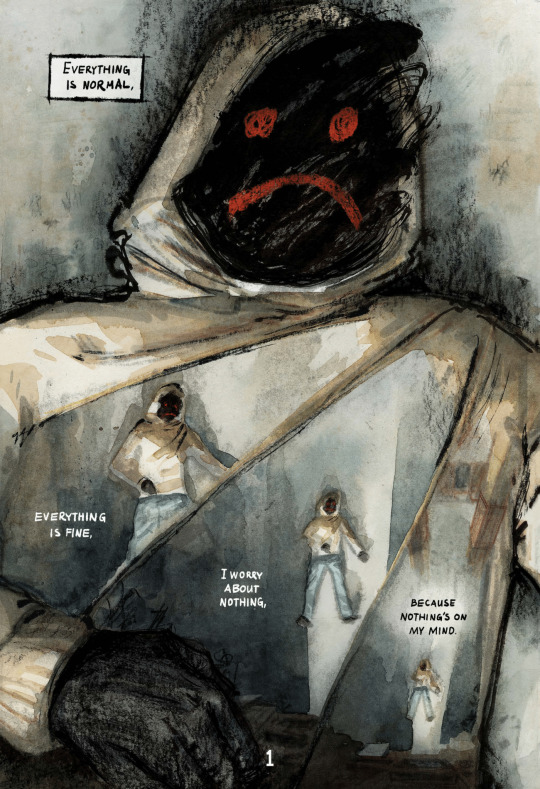
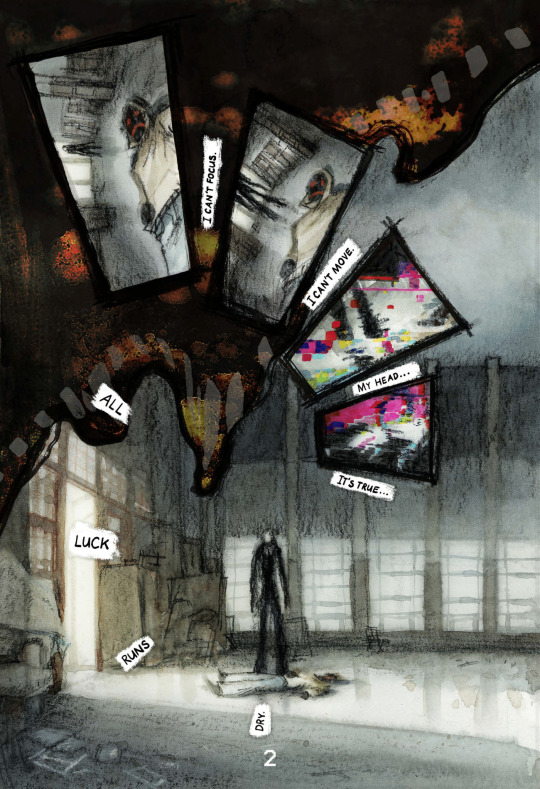
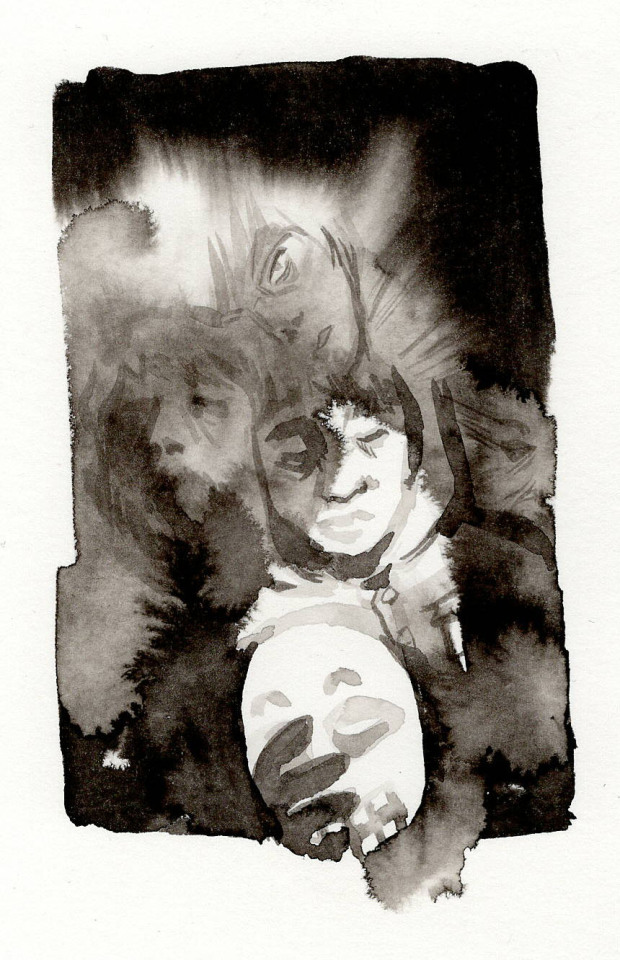
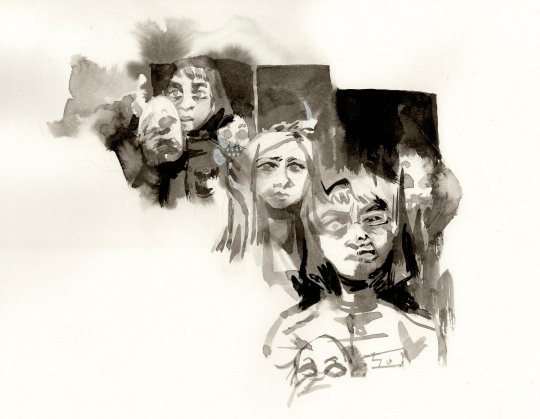


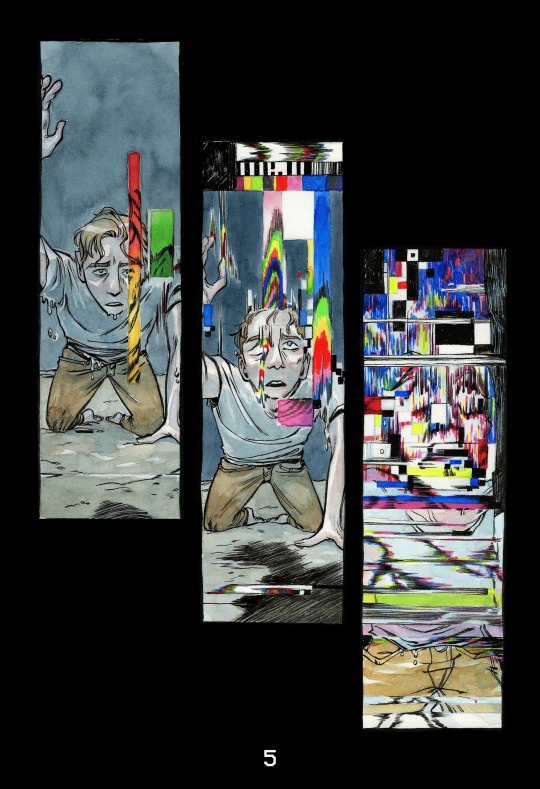

done entirely in water color and ink, it builds beautifully on what was laid down with the original series and carves out its own identity and legacy.
it's also just very lovely seeing queer creators who were once writing subtext be able to just. Be Open about it. both about themselves and their characters. it's a horror story that happens to have queer characters mind, but it's just ! nice.
.
now ! being internet horror that's sat in that weird space between args and analogue horror (nightmind would call it Unfiction, but unfortunately that term hasn't caught on as much as I'd have liked) it's not as simple to get into as just like, Watching A Show.
that's not to say you Can't just watch it, but rather I have ways to help you get more out of it :>
1: The full chronological playlist for the marble hornets web series, including the totheark replies: [Link]
this is exactly what it says on the tin ! the entire series in order, I've even included the dvd extras at the end of each season !
two notes: firstly, the full series is captioned, and I think they're very nice captions! and secondly, there's a lot of loud noises in the series, which the captions help mitigate a bit. this is due in part to the nature of the kind of horror it is (though it doesn't have straight up jumpscares), but Also because troy wagner was HoH at the time he was doing the audio editing for the series.
there's significantly fewer issues with the audio as the series goes on (troy actually got surgery for his hearing!) but for the most part it's fine just keeping it Somewhat lower. except entry five. entry five is so very loud <3
.
2: The in-character twitter for jay merrick (the main character of marble hornets): [Link]
much like the youtube channel is presented as being ran by the main character/pov character of the series (jay merrick), the twitter was created to run along-side the main series! it mostly exists to give us further insight into jay's mental state and personal life that you don't get in the main series, especially early on!
it's a little cumbersome nowadays, especially since twitter doesn't Like being archival. but you kind of just have to scroll all the way to the bottom to when the twitter was created and scroll up to follow along jlkfasdjlkfdas
this is made a Little more difficult because the account got hacked in 2020 and reinstated 2021, so all of the dates are wrong now. but the account always posted when new entries were uploaded so it's easy to watch an entry, check what was posted after it was uploaded, and then see the link for the next entry and know to stop until you've watched.
you don't Have to do it this way, but I think it's the way to get the most out of it!
.
3: All of the translated codes for totheark/tta listed in order: [Link]
back in the day, youtube allowed you to make Video Replies, which would be displayed Under whatever video you were responding to! this feature was ultimately removed because of the tendency to do make clickbait in response to whatever was currently popular, but it was Wonderful in this instance !
the youtube channel and twitter were presented as in character, and they took advantage of this by having a second channel created (named totheark) start Replying to the entries as they were uploaded. these videos were highly edited and contained codes and secrets that were meant as messages to the main character (and the audience)!
there was a dedicated community for code breaking throughout the show's entire life, and this list here goes through every one! I like this one in particular because it Also gives us information on How the codes were broken, in a digestible way.
.
4: Nightmind's marble hornets explained series: [Link]
this is definitely Optional. it's obviously not official media, is outdated now that the comics have started, and I'd say was flawed even at its release. (it's not a spoiler if nobody knows what I'm talking about, so I'll say now that I'm not a fan of his theory with masky, and the seth theory is very famously silly).
BUT! I Do think it's a very good resource when it comes to putting certain crucial things together. as the whole point of the series is that it's a Mystery. you see nearly everything out of order and you're intentionally limited in what you know about characters and their motivations. this series works as a good jumping off point in that it helps to put things into Context and change your perspective on certain events and character With the benefit of said context!
like I said, it's not Required, it might just be helpful! a starting point to help chew on things once you've watched the web series in full for the first time.
.
Comics!: [Link]
comics ! they're all available on troy wagner's personal website! (along with other goodies that are periodically available!) you can buy them either physically Or digitally ! personally I'd recommend digital, as it's cheaper, instantly available, and the digital extras are wonderful!
they come with the script for the comics, a commentary version (including comments from troy and jackie on every page), and other extras like backgrounds, behind the scenes sketches, character art, etc!
I would very much so suggest buying the comics if you're interested. this is an indie project being ran and funded by two people (and again! there's other goodies in the store that are worth looking at). buttttttt, my friends may dm me <3
.
Extras! [Extras]
Anniversary streams [Link] on a few different anniversaries for the series several of the creators have done streams rewatching the series and reacting to it live ! this is a playlist where I've collected all of the instances that I could find :>
I Also included the dvd commentary here ! the format is different, but it's a similar concept so, why not ljkfsdajklfasd
.
Interviews, QnA's, and con appearances: [Link] exactly what it sounds like !
I was, at one point, overtaken by some kind of madness and hunted down for every single Person Records Marble Hornets Creators Talking About Marble Hornets thing I could find, and then attempted to put it in order. this is just ! for fun. I do so adore it though, I have one con panel that was recorded on someone's 3ds.
.
My silly posts:
some analysis posts I've main on my main account since having watched the series ! these all contain spoilers so I wouldn't suggest watching them until you've seen the show (though I Would suggest reading them if you do choose to watch the explained series)
this is my post going into what I think masky is supposed to be/represent, and why it's Important [Link] which I think pairs nicely with this post by tim sutton (one of marble hornet's actors) [Link]
my discussions on jay's mental health and behavior and how they're often misunderstood (which won't necessarily be needed if you've read through his twitter jlkfasdlkjafds) [Link 1, Link 2]
confirmation that jay is canonically queer :> [Link]
.
Social Media
Social media for various marble hornets creatives !
Troy wagner (co-creator, actor for jay): Tumblr [Link] Twitter [Link] Instagram [Link]
Jackie Reynolds (main artist for the comics): Tumblr [Link] Twitter [Link] Instagram [Link] Linktree [Link]
Tim Sutton (actor for tim (I know)): Tumblr (inactive): [Link] Twitter: [Link]
Joseph DeLage (co-creator, actor for alex): Twitter [Link]
.
and here's art jackie drew of masky marble hornets punching richard spencer in the face <3
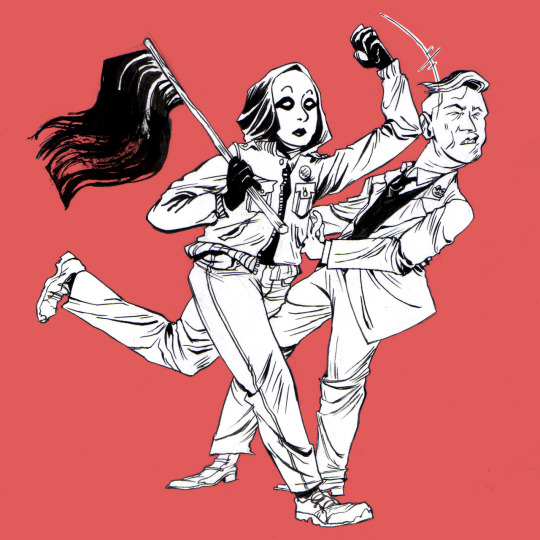
103 notes
·
View notes
Text
Another pro-reader tip for mxtx novels: they are all stories with clear-cut good guys and bad guys and a strong moral message, BUT you have to actually read what the story has to say about characters without taking anything at face value, relying on genre tropes, or using identities and statuses as shorthand to your understanding of the moral system and themes of the story. So no, most characters in her stories are not morally gray (though some are, most can be definitively categorized as either morally good or bad, and ALL of her main characters are definitively morally good), and no she does not write morally gray plots where “morality is just subjective!” If anything, the term I think people are looking for is “morally neutral” (meaning that the thing is not assigned a morality in and of itself) in many cases.
An mxtx character is never designated as good or bad based off their backgrounds or class: Wei Wuxian, Jin Guangyao, Shen Jiu, and Mu Qing all grow up outside of the elite class, but Mu Qing (eventually) and Wei Wuxian are unquestionably good guys while Jin Guangyao and Shen Jiu are unquestionable villains. Shen Yuan, Lan Wangji, and Xie Lian all grow up within the gentry class but are all good guys while Jiang Cheng, Jun Wu, and The Old Palace Master are bad. Likewise, life circumstances or tools don’t determine morality. In mdzs, the sword path (which is the orthodox one) is used to commit genocide by the general cultivation world just as easily as Lan Wangji wields it to protect the forsaken commoners. Wei Wuxian’s ghost path was created to protect himself before being used to protect others, but Xue Yang and the Jin Clan pervert it to cause mass destruction for their own wishes. In tgcf, Xie Lian uses his god powers to attempt to help the Yong’an people while the other gods simply collect worshippers to increase their power and oppress lesser gods. Every character I’ve listed minus the Old Palace Master has experienced intense trauma that has informed their lives and colors their morality, but it does not define why they have chosen to take on certain moral stances.
(This is not to say that mxtx doesn’t have certain tropes she dislikes, as she clearly hates the “dedicate their whole existence completely to another person” trope. Su She, a villain dedicated to Jin Guangyao, dies. Zhuzhi-lang, a sympathetic antagonist dedicated to Tianlang-jun, dies. Hua Cheng, A WHOLE LOVE INTEREST dedicated to the literal main character, dies a whopping three (3) times before he learns his lesson.)
Mxtx does not condemn those who stray from orthodoxy. In fact, every story she’s (currently) written is about the dangers of entrenched and unquestioned hierarchy and status quo giving way to corruption every time. She wants you to question the dominant narrative of the benevolent group who descend from on high to “save the ignorant masses.” She wants you to question the idea that the only people with the right of choice are those at the top of the hierarchy. She wants you to question the idea that even the smallest decision of “powerless” people does not matter in “the grand scheme of things.” She wants you to actually think about the story conventions that you accept as infallible and question whether or not it would make for good shorthand by which to understand well-written characters and story arcs (and also, hopefully, how society is structured at large). So if you find yourself reading an mxtx novel and siding with the mob characters or lamenting how x character was locked into making certain choices “against their will” or being unable to reconcile how a recognized trope led to an unexpected conclusion because “that’s not how it’s supposed to go,” then it may do you some good to stop and ask yourself “was this idea supported by the narrative that I read in the book, or is this an idea I’ve come to entirely from my own preconceived notions of how I wanted the story to turn out based on how other, similar stories have panned out?”
#human metas mxtx#mdzs#svsss#tgcf#and this isn’t to say that you can’t question mxtx’s choices#again her work BEGS you to do just that#but you can’t have an adequate critique of something you refuse to even see for what it is#if you are expecting a normative genre piece from mxtx#you will leave disappointed with the ways in which she specifically breaks those norms#you will walk away without understanding how or why she chose to do so#and you’ll misunderstand her intentions and her works by foregoing this understanding
492 notes
·
View notes
Text
day 4 of being incredibly normal about hawks and endeavor (but mostly talking about manga spoilers in general):
mha is a story incredibly interested in exploring generational support, generational abuse, and what people pass on to each other (alongside hand motifs and showing the childhoods of different characters). you pretty much can't get through any arc without running facefirst into a plethora of examples, but ofa and afo are fun (and perhaps appropriate) places to start!
horikoshi features doomed siblings almost as much as he features terrible fathers, and these two are no exceptions. alongside those versatile hand motifs, afo literally uses his hands to take from others, while anything he has to "give" goes to those younger than him, and it's pretty much always a direct vehicle for trauma. it works well that he's lived for such a long time, literally sustaining his own life thanks to hoarding more and more power and resources for himself, while also giving him that age hegemony over all other characters we meet. he thusly kinda becomes the mustache-twirly Evil Dad² in a metaphorical sense, ruining the futures of others as he attempts to write his own narrative exactly how he wants it (storytelling is also a big theme in mha, go figure. when i consider that one definition of trauma--as something that disrupts the narrative one has of themself--and how AFO hands out trauma also as a way of commanding power and controlling the narrative, it really all comes together).

Yoichi is, of course, opposite in so many ways, centered around giving instead of taking. the inception of ofa began as a (very, uh, heterosexual i'm sure) act of granting freedom and sacrifice.
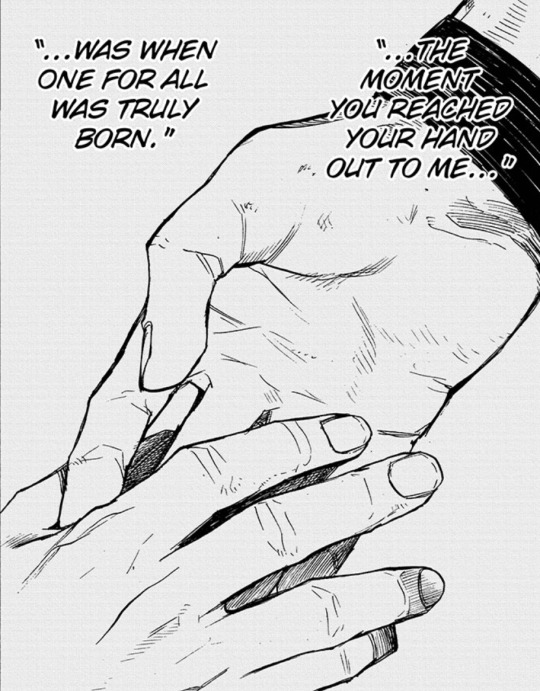
the ofa wielders don't just give their powers to the stockpiling quirk; they also give their lives, through combat or through cutting their lifespans or both. opposite to afo's Big Mean Father² lifespan, the lifespans of the ofa wielders are very short. they sacrifice their own futures to make the futures of others brighter. and of course, through the act of passing on the quirk, ofa necessitates an act of giving from one user to the next. it's a hand-off of counsel, support, and duty that helps shape each receiver into the best kind of hero they can be. afo passes down trauma, and ofa passes down tools for one's betterment. pretty standard parallels to how a bad caretaker/good caretaker can, even through a single act, shape an entire existence younger than them. relatable! trauma nation rise up!! 💪💪💪
with these themes in mind, then, it's a no-brainer as to why mha features so many godawful fathers (also i'd bet a hundred bucks horikoshi has daddy issues. a thousand. a trillion, honestly. gimme money). though relationships that fall outside the clear-cut power-dynamic of a parent to their child still carry these themes well. peer-to-peer,

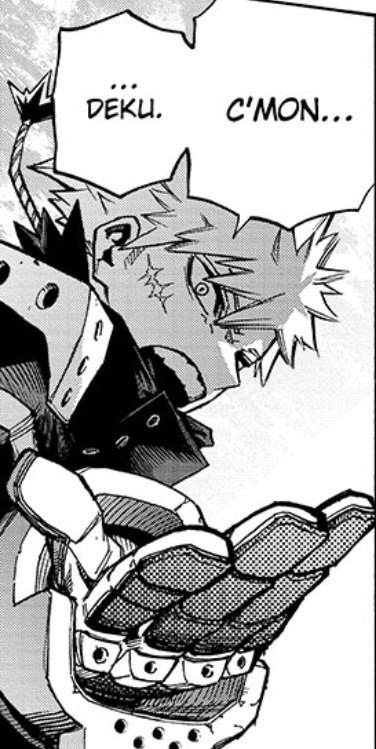
sibling-to-sibling, etc., the list of other examples goes on and on!
endeavor's character certainly straddles a lot of these ideas, perpetuating a lot of column A (bad) and a bit of column B (good). he receives trauma from his father in the form of spiraling thoughts about failure and mortality (and maybe those two things are totally equivalent, right?) ((they're not)). his response to that trauma then goes far in the other direction, an obsession with herodom and invulnerability (especially avoiding or punishing emotional vulnerability) that passes the trauma right down to his family. in all his desperation to avoid the tragedy of his father's death, he ends up causing the tragedy to repeat itself, this time with touya's (apparent) death. it's even a direct result of the quirk he gave to touya. every intangible and tangible thing touya inherited from his father would only go on to hurt him, and the worst thing that could possibly have happened does indeed happen. instead of coming to terms with the fact that he gave touya the wrong things---trauma and a fire to burn himself with---he gives more of the same to shoto. surely the same tragedy won't repeat a third time. surely what he passes down to his youngest will make him come out of everything gloriously successful and *alive* (and those two things are totally, definitely equivalent) ((and again, they're not)).
what blows my mind is just how close the todoroki family was to witnessing yet another repeat of the tragedy--that they might have watched endeavor die while failing to save someone, just as endeavor had watched his own father do the same---and that they nearly had to bury touya a second time.
similarly, when it comes to the past transferring to the future, childhoods are the foundations upon which peoples's futures are built. characters are not only shown in a state of emotional vulnerability when in Baby Form, but are also responding to and trying to find answers to each others's traumas and core drives.
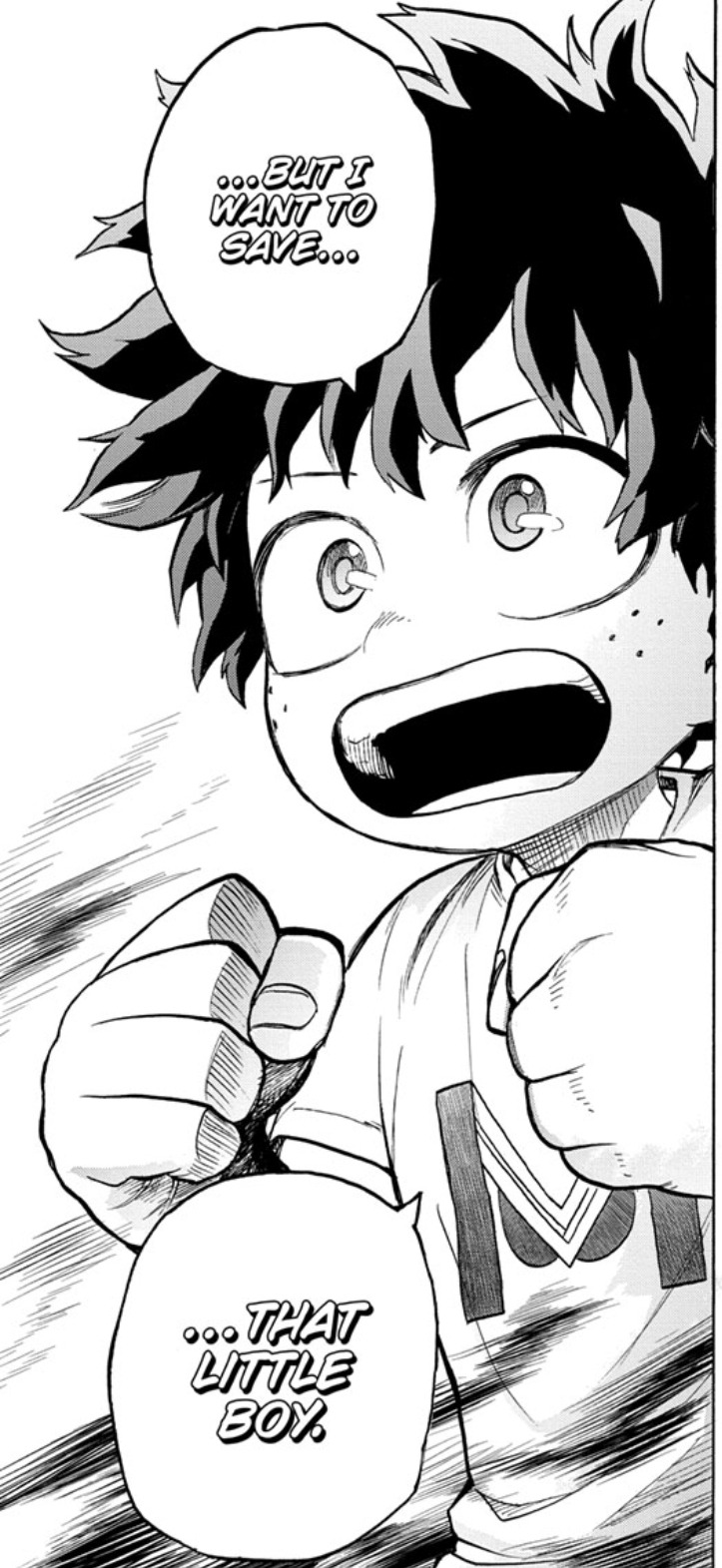
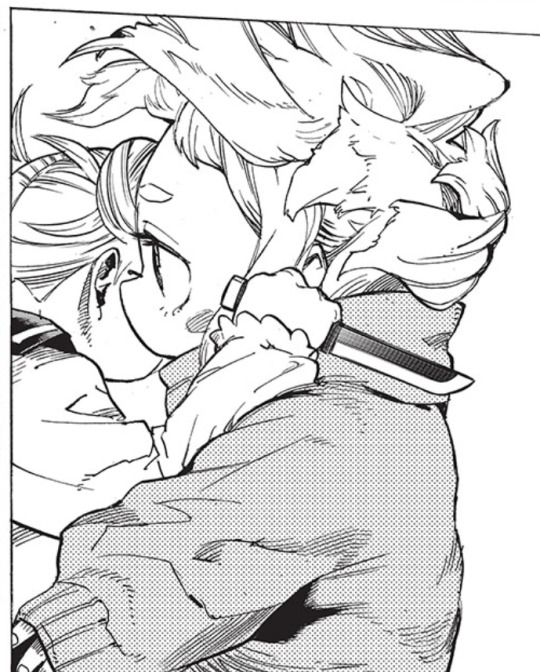
in a sense, they don't just inherit their worldviews from the prior generations, but from themselves. when we see endeavor confront his younger self, he isn't only killing off who he used to be, but also all the conclusions he had drawn from his own childhood--a rejection of what his trauma response got wrong. most people have to learn to stop being cruel to their inner child, whereas his inner child is the cruelest voice within.
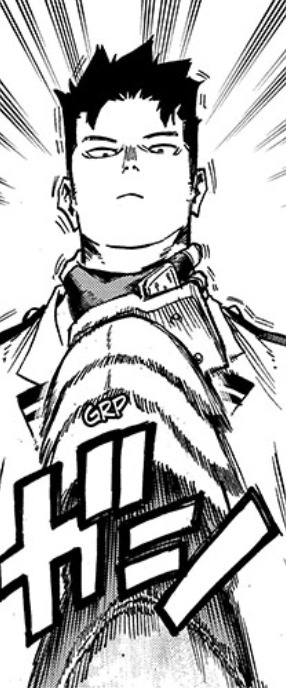
anyway, for all the Bad Shit endeavor has passed on to the next generation, the future and hope he provides for hawks is something else. despite all white-knuckled efforts, he doesn't end up saving his family, nor himself, and certainly not touya, but he saves hawks, and that one instance contributes to the entire idea of ofa and the question of what different people can give to each other.
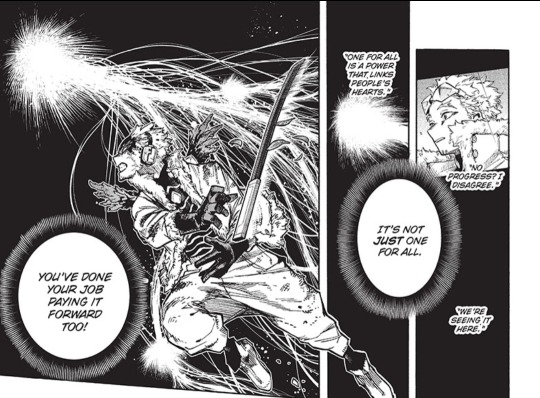
as invested as hawks is in the future, he initially keeps himself pretty distant when it comes to those younger than him. there isn't much explicitly given as to why, but it's pretty natural to assume that he really doesn't have the tools to pass on anything healthy--not after what he's been given by others. the one good thing he knows how to give is the one good thing he's received, which is the act of saving itself. being a pro is the only language he has for the longest time, and once his back's to the wall and he has to give tokoyami whatever he can, we see how readily he assumes that what he has to offer just isn't good enough.

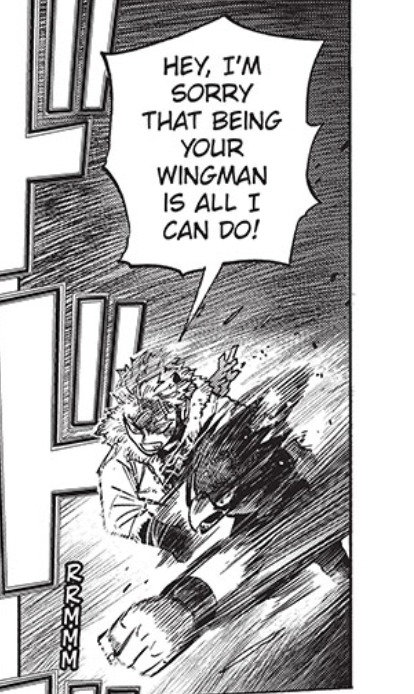
(not only did his parents pass trauma onto him, but in valuing or devaluing his wings and thereby making his worth always conditional, they also affected what he could then pass on to others ((or at least, how he conceived of what he could give)).)
in my view, hawks gives tokoyami flight and endeavor support, and from tokoyami he receives the idea that he's someone worth looking up to and fighting beside despite his shortcomings, while from endeavor he not only got saved as a child but also receives a proof-of-concept of the ability to radically change, to wind up in a morally/emotionally better place than where one started. (he not only contrasts himself against shoto for the kid's ability to forgive/work with his parents, but notably contrasts himself against endeavor due to the latter's willingness to engage with his past, which he views as a vulnerability but also as something admirable.)
given keigo's middling age in the main cast of characters and the interesting space he occupies, it's fitting that he would ultimately act as a sort of channel between the generations of heroes as of the finale, retaining some of the value from what came previously while also helping guide what comes in the future.
#oh god these just keep getting longer and longer#mha manga spoilers#also shout-out to tenko for being the prime example of the hands and passing-down motif#like my guy inherited so much trauma and literal destructive ability that he is the ultimate Hand-Imagery Man of anime#which is seriously saying something#*slaps roof of tenko* this anime lad can fit so many fucking f̷̼͎̄̍i̵̦̓n̶̡̫͍̦̱̎̑̍g̸̣̰̳̪̯̑̐͠e̶̡̢͎̬͂͝r̴̔͑̊̽͜s̸̞̳͉͓̅́̏͘͝ in him#take that as you will ig idk#endhawks#if you squint#honestly if someone responded with just “not reading that essay” they'd be so right and i'd have nothing but respect
36 notes
·
View notes
Text
Batmen Eternal:
Oh TYNION. (Posits a future Tim at university with Sebastian Ives and Simon Valentine)
Simon Valentine. SIMON VALENTINE. You magnificent bastard sneaking even more Tim & Kon (and Tim/Kon) in here as best you can while Kon still does not, in fact, exist right now.
I also feel I haven't talked about Ulysses Hadrian Armstrong enough in my reviews of this run, and that's partly because the General is not exactly my favourite character, but it is interesting in how he's been twisted to be a Bat superfan in the most creepy manner, in regards to their quasi-paramilitary traits, which does fit in with Ulysses being Ulysses. Also his obsession with Tim, and his lovely little personal cave there full of idolisation of the exact wrong sort of military dictator generals. Ulysses finally getting his General haircut back (with the stars even growing in between issues, which is the funniest shit ever. Tim hallucinating them, Ulysses deciding he needs them in his program?)
I do like that we finally start to get a bit of Tim and Cass's late preboot dynamic returning between them. It's not 2011 level, but definitely is at least 2005ish in terms of the trust they start displaying in each other.
Steph and Cass finally getting more of their own revelations about preboot timelines is of course satisfying, if a little sad in terms of them both being like "they let me be part of the club??" That bit feels a bit more like Doylist commentary aimed at discussions of who counts as 'family' more than what's actually been portrayed on page through this entire run (which is Cass in particular actually inhabiting a LOT of the same spaces she lived in during the 2000s, including having space at the Manor nobody questioned).
And of course we finally get the OMAC payoff that's been teased all this run, because of the themes of control tied up in it via Brother Eye and its previous incarnations. I am enjoying it, if only in a slightly exasperated way, because what is happening here makes a great deal more sense if you're across what goes on with OMACs around Infinite Crisis, and the statements this is making about what Future Tim has done (that is, leant into Bruce's worst paranoia and picked up one of his old projects and modified it), rather than how I think this reads to newbie readers, which is at best "Tim learnt about protocols from Bruce". Because no! This is ongoing commentary on the "do we trust Bruce with protocols" discussion all the way back to Tower of Babel, at least, and Tim's altering position on them over time and what he will and will not do about this.
I like it! But I like it in context, and I worry it loses a lot of meaning when read by an audience who doesn't see Brother Eye show up and go "oh of fucking course, Bruce". This is supposed to get you mad at BRUCE. Even the reveal that Bruce was of course involved doesn't get across enough "BRUCE PLEASE STOP TRYING TO CONTROL EVERYTHING" (he will not).
(This is also to say this thread continues on and gets picked up in the Failsafe arc, which is "hey look Bruce's paranoia's back again, time for a new variation!")
I like where this finished, in terms of setting up potential future storylines of characters to spin out: Luke back out of costume for a while (typical, he does that frequently); Jean-Paul off to Justice League Odyssey; Kate offscreen for another Religion of Crime storyline/the end of her present Batwoman run; Cass set up to have her background with Babs re-established; Tim and Steph heading off to the starting point of Young Justice 2019; Clayface to ???? with Dr Victoria October (presumably to transition back to villain off panel for next time someone uses him). They're nice clear hooks and I enjoyed that it was done.
Was this a perfect run? No. But in terms of getting the characters assigned to it back on track in terms of characterisation and resupplying them with as much of their preboot characterisation as possible? It was incredibly successful. Definitely the best Bat title of the first 2 years of Rebirth (followed by All Star Batman).
14 notes
·
View notes
Text
hhhhhhmhmmhmmnnnnmmh Buddy Daddies is making me Think Thoughts and Feel Feelings
but i’m not gonna be doing any analyzing of the show or plot itself since 1. i know absolutely nothing about Japanese family/culture/norms/society in general and there’s plenty of amazing posts that talk about that already and 2. the show doesn’t really keep things hidden like a series like bsd does, so there’s not much to theorize about. so i’m not going to go searching for things that don’t exist in the story
however, what i am going to do is over analyze and look for things that probably don’t exist in the songs in the OP and the ED of the anime. yep. my brainrot is that bad
listen episode 7 did something to me okay
i think both songs symbolize Rei and Kazuki in their own ways, especially the OP since i think it encompasses both of them from the first to second verse of the song. the ED is where it really gets interesting, since for now it only really symbolizes one of them
🔺spoiler warning for episodes 1, 3, 6 and 7 and also basically the entire premise of both Kazuki and Rei's characters lol🔻
also long post warning. like, really really long post. i pulled out all the stops in my analyzing for this thing
The opening - SHOCK! by Ayase
fun fact Ayase is the vocaloid producer for the duo YOASOBI
So for this song I’m taking both the translated lyrics provided by Crunchyroll subtitles and the translation on the Miraikyun website I found while digging for reliable translation sources (I found… almost none for this song tbh). But I’ll include screenshots from the OP mostly for the first verse of the song that’s actually used for the opening of the anime.
So at first this song came off as lighthearted to me because the music itself is pretty upbeat and pop-ish, and while yes it is both of those things, the lyrics definitely tell another story of their own. The overarching theme is essentially the contemplation of what love is and what it means, and how the person singing isn’t able to understand love when they see it. They also don’t know what’s going on in another person’s head (who is potentially experiencing said love that the singer doesn’t understand). Immediately this makes me think of Rei’s character, in a couple of ways.
In his character PV it explicitly says that he’s someone who “doesn’t know love”, specifically using the character 愛 (ai) which is used for a more general type of love (could be family or other long-term relationships) and doesn’t necessarily have romantic connotations. This is a perfect example of how Rei, as a person, doesn’t understand the concept of “love” in general. It’s foreign to him, and it’s pretty obvious after episode 3 that he wasn’t raised as a normal child by his parents, he was raised to be a hitman by his father who wanted Rei to only refer to him as his “boss”. I don’t think I need to explain how much that would mess up someone’s perception of love in any sense of the word, and the anime actually does it for us by showing Rei as unfit for taking on a proper parental role in the makeshift family in the first few episodes. Hell, even in the beginning of episode 7 he seemed more like another kid in the house instead of Miri’s caretaker. He’s not used to being responsible for another human being, and it shows, but it’s because he genuinely has no idea about any of it since he doesn’t have any parental figure to base his standard of being a ‘parent’ off of. Kazuki is arguably the same in that regard, but he’s much more mature as a parent compared to Rei because he knows what it’s like to not have any parents or caretakers at all, and he wants to make sure Miri has good parental figures in her life so she doesn’t go through the same thing.
The lyrics in the first half of the song and the lyrics in the chorus can absolutely be used to symbolize Rei’s character here.
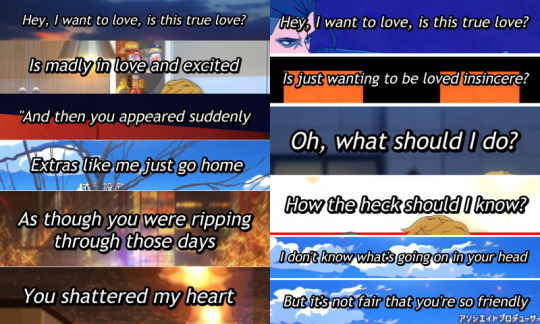

Rei does want to be a part of the family here, we solidified that in ep3 when he declared that he was Miri’s Papa. That was a key piece of character development for him, since before this we don’t see them interacting during the episodes as much as Kazuki and Miri do. So the lyrics about ‘wanting love’ is symbolic of him admitting to wanting to be a part of the family. The part about the city being ‘madly in love and excited’ is just how he sees things, since he was taught to never smile or really express any emotions for that matter, so everyone else is automatically more expressive than him. He stays home a lot to play video games nonstop and chain smokes through all-nighters when Kazuki isn’t there, and he also tries to go home before ultimately being dragged outside by Kazuki. The next few lines could symbolize how Miri entering his life turned everything he was used to upside down, and his perception of life is slowly being torn down by Miri as he learns what it means to love and be loved in a parental way. The chorus just further drives in the fact that he truly has no idea what ‘love’ is, literally saying ‘How the heck should I know?’, but also that he doesn’t entirely understand Kazuki and why he’s so adamant on being a good parent. The ‘I don’t know what’s going on in your head’ line is perfectly fitting for ep6 when Rei was questioning a lot of the things coming out of Kazuki’s mouth (same. ‘our genes’ bro what). He’s also dragged through shenanigans time and time again by Kazuki and despite his complaining, he goes along with it anyway. The line about being unfairly friendly could be towards Miri or Kazuki, since sunshine Miri accepted Rei as he is and she loves her Papa no matter how emotionally dead he is, but also because Kazuki is probably the only real friend Rei has (which is something I’m sure will be explored in a future episode. Hopefully). The last one is directed at Miri, since Miri is also able to drag Rei into playing with her and doing other things despite his reluctance (just look at ep3). However, he still very much acts like an irresponsible child and more like Miri's sibling that Kazuki also has to take care of, so he has a long way to go before he's any sort of model parent…
Kazuki on the other hand is 100% symbolized in the second verse of the song.
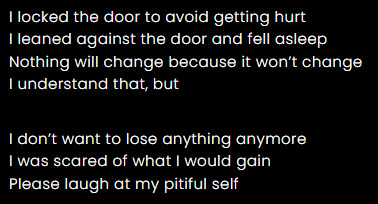
I will die on this hill because there’s literally no counter argument after ep7, where we are explicitly shown that Kazuki is clinging on to his past to his own detriment. He’s scared of changing because he’s scared of forgetting Yuzuko if he’s fulfilled by something else (his family). He also calls himself pathetic in ep7, connecting the line about laughing ‘at my pitiful self’. This part of the song truly captures how Kazuki feels on the inside for the first 6 episode and the majority of ep7. The chorus could be a bit different in regards to 'it's not fair that you're so friendly', since that could be directed at Karin because she wants Kazuki to be able to move on and be happy with what he has since she believes that that's what Yuzuko would've wanted.
The ending lyrics symbolize that changing and looking towards the unpredictable future is okay, but oh my god did the ending hit like a freight train after episode 7. Just. Just holy emotional damage. Oh. My god.
The ending - My Plan by DURDN
I was able to find a translation that was basically the same as the Crunchyroll one on Genius Lyrics to reference the second verse yipee but I also included screenshots from the ED itself of course
I cannot get over how impactful this song became as the ED, especially at the end of episode 7. It’s basically an entire episode dedicated to Kazuki’s backstory, which we were shown glimpses of back in ep1 for crying out loud. And oh my lord it did not disappoint, that’s for sure. Emotional damage for everyone. So much character development in one single episode. I just--it's just great. That's all I can say.
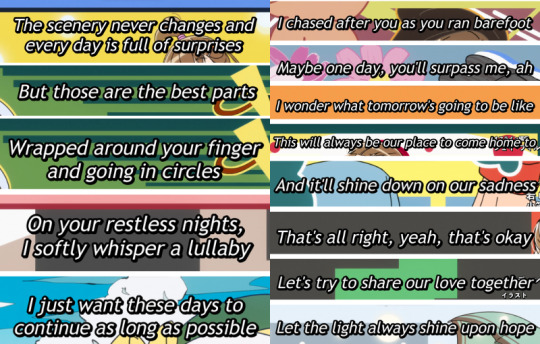
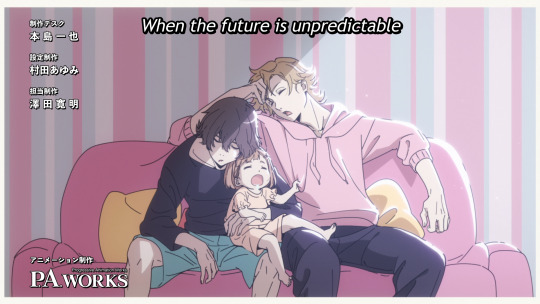
I love this image and it lives in my head rent free. Sleeping Rei is always 10/10
The song has a theme of accepting the future and that things are going to change, but that it’s okay because there will always be something consistent there, like a home to come back to every day. It also has a lot of references to love, like the 'I softly whisper a lullaby' and 'let's try to share our love together', which is symbolic of Kazuki as a father. It doesn't really have any romantic connotations at all, it's just wholesomeness. Plus 'I chased after you as you ran barefoot' is reminiscent of the few seconds in the OP where we actually see Kazuki running past other people going the opposite direction, and then following behind Miri with Rei at his side.
Also episode 7 really brings out the last 5 lines, from 'and it'll shine down on our sadness' to 'when the future is unpredictable'. That scene where Karin told Kazuki that he should move on and be happy with what he has because that's what Yukuzo would've wanted, and then the rain stops so the sun can come out and shines on Kazuki's new outlook on the future and accepting change... It's so fucking beautiful and symbolic. Not to mention it's taking place where he and Yuzuko first met, where she was his proverbial ray of hope when he was wounded in the rain, now the rain stops and Kazuki is able to see hope in his future with his new family. I just cannot express how impressive that is from a storytelling standpoint, and it's all literally just using the changing of the weather.
Also the line of 'maybe one day, you'll surpass me' could be referencing how Kazuki wants Miri to be able to have the things he never did: a family, stability, and that familial love. Kazuki is painfully self-aware that he became a hitman (and a malewife) because he grew up with no parents and had to fend for himself his whole life. He wants to make sure Miri never has to go through any of that, and have more opportunities that he never did when she gets older.
The ending song doesn't really fit Rei as a character, even in the part not used in the ED. The second verse is still very much relating to Kazuki and Miri's interactions day-to-day and him enjoying raising Miri, and knowing he'll be endeared by everything she does no matter how old she gets (like any other parent, I assume. idk I'm a Rei kinnie). But we know that Miri is changing Rei slowly, from ep3 when he begins to see what being a Papa means to ep7 when he learns that sometimes taking care of another human being can make you feel powerless in the face of a 'crisis'. Most other times we only really see him being a real parent to Miri when he's dragged into it by Kazuki, but ep7 showed him going from irresponsible second child of the household to going to Kyu-chan in a panic because Miri is sick and he has no idea what to do as a parent. Hopefully we get to see this built upon further in the coming episodes, even if we don't get to explore his backstory as much as we have Kazuki's this season.
#why did i go through the lengths i did for a silly found family anime#idk but it was worth it#buddy daddies#buddy daddies spoilers#rei suwa#kazuki kurusu#kyutaro kugi#miri unasaka#meta analysis#this was a fun change to my usual meta posts for bsd too#this anime gives me incredible amounts of serotonin#maybe i’ll do another if we see this kind of development for Rei but in his own way yknow
57 notes
·
View notes
Text
So for anyone who doesn't know, in IDW1 Trypticon is actually a really interesting character. Earlier in the timeline, he's basically just an ancient evil monster that gets awakened and used as a fighting force by the Decepticons (covered by the events of Monstrosity and Primacy, although I'm not sure if he made an appearance earlier in terms of the comics' release order).
Later on in the IDW1 comics, Trypticon becomes a character with his own personality and desires as written by Barber in the Dinobot trilogy (not the phase 1 series but Punishment, Salvation, and Redemption). Basically, Trypticon is very aware of the fact that people see him as a violent monster, but he decides to abandon Cybertronian society entirely because he's tired of being used as a vehicle for others' violence. By the end of the trilogy, he actually has a new hotspot inside of him and is nurturing the next generation of protoforms within his own body. He's literally done a 180 from being a source of destruction and death to being a protective, nurturing, life-giving force. And this is interesting because, although Trypticon DID have a personality before Barber wrote him, Barber's take on Trypticon gave the "big scary Decepticon titan" a much more 3D personality that made him a person with his own goals, disinterested in the plots and schemes of others. And that's really cool!
So what ended up happening Trypticon in the finale of IDW1, Unicron?
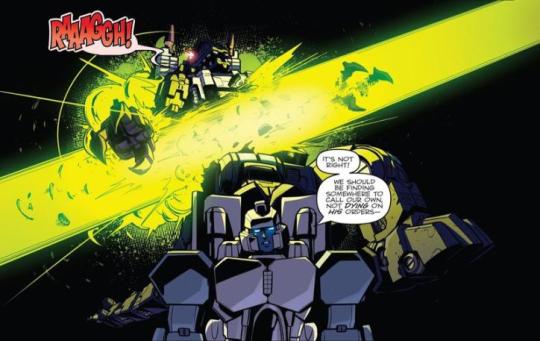
He gets killed off. In the background. With no one giving a shit about it. Because Barber decided it was more important that, IN THE FINALE OF THE SERIES THAT WAS ENDING IDW1 AND WOULD BE THE LAST ISSUES HE WOULD EVER WRITE, we as the viewers be subjected to a Literally Who OC that no one cares about crying and bitching about how Optimus Prime is a tyrant and a fascist. This entire panel is almost literally shot in a comedic way, like the trope of "person monologuing while something crazy happens behind them that they're completely clueless to."
Trypticon got an interesting characterization that made him more than just a monster, but I guess it was more important to kill him off in the background of a panel so that Miss Literally Nobody can waste an entire page of the LAST SERIES OF THE CONTINUITY being a whining bitch about Optimus, which by the way is what she's been doing literally this whole time since she basically exists just to complain about Optimus.
Oh and by the way, Trypticon was carrying the next generation of protoforms inside of his body, and Cybertron (plus every other colony) got destroyed during the Unicron finale, so I guess an entire fucking generation of new Cybertronians also got slaughtered in this panel. How fun and exciting! I guess putting in that really depressing character death of "man changes his ways and gets to live happily but gets killed off for shock value" was really important to put in the ending of the series to make us readers feel satisfied about our beloved story ending! Oh but not only does he die, he dies IN THE BACKGROUND PRACTICALLY AS A FOOTNOTE so that a different character no one cares about can talk about her feelings, wasting crucial time bitching about how much she doesn't like Optimus while TRYPTICON IS LITERALLY DYING BEHIND HER BUT I GUESS SLIDE IS SO MUCH MORE IMPORTANT FOR US TO BE CARING ABOUT.
This is what happens when you're more concerned about huffing your own farts Writing A Theme, Man than you care about creating a satisfying ending that fans will actually enjoy lmao. Who cares about Trypticon and possibly his children that we got attached to as a result of the previous comics dying? This literal nobody who no one cares about needs to have her time in the spotlight monologuing about shit that doesn't matter while everyone around her is fucking dying.
#squiggposting#slide is the worst character in idw1. literaly the worst#she's like the peak of barber sabotaging the readers by interrupting emotional scenes just to have someone complain#also she's a privileged colony bitch who's never lived through war in her life but still feels entitled to judge the ppl who lived through#like. i don't care about her. she's stupid. she's an idiot. she's annoying. she got way too much screentime#she existed just to shit on optimus prime who's a character that actually matters unlike her#but i guess we couldn't even cut off IDW1 in an aborted season finale#without barber having to insert his depressing 'cybertronians suck and optimus sucks' nonsense in it#bc god forbid the FINALE OF THE CONTINUITY be focused on characters that are more important or have had more development#yes this is me being petty and fan wanking but also. slide sucks#little fucking worthless brat wasting way too much screentime existing only to complain about all the other established characters#that have actually had a whole series behind them and who the readers are actually attached to#absolutely worthless character who only existed to waste my time and improved nothing with her existence#squiggle being petty
15 notes
·
View notes
Text

Umm what. How has it been 10 years since I got into SnK, started sharing a ton of thoughts about it and met @momtaku?? The fact that I’ve since fallen out of SnK and cycled through many other fandoms and interests lends some credence to this number. Still: ten years?? Sounds fake, but okay.
In honour of this dubious anniversary, I figured it might be fun to look back on the posts I've made and select my top 5 favourites (in no particular order). I instantly broke my own rules and went for groups of posts instead, but here we are:
I do still like my early post on Eren's characterisation, where I talked about how the narrative literally didn’t let Eren win on any terms on which he was prepared to fight. It got a spiritual sequel in this post, which talks about Eren in the later stages. I never finished the manga, so I don't actually know how accurate that reading was in the end... but it felt true at the time of writing:
Eren just gives the impression of a person who’s gazed into the abyss for too long, and the abyss looked back. The one thing he seems to have learned in this narrative is that sometimes Bad choices are your only choices, and even if that makes you a Bad person you still keep moving forward. At the core of him is still the same steely resolve that has kept him going the entire time, but he’s stopped reaching for moral high grounds or possibly even believing that they exist, which is the worrying part. He’s now okay crawling in the dirt with villains, if that gives him his victory. And this, this is something that no one wanted Eren to become.
Mikasa-centric posts galore. She was my favourite character for a long time, so I think that's why I have a soft spot for those posts.
I think generally posts speculating on the themes of the story: the circular nature of violence, moving forward and fighting on, redemption, the human condition, the inherent moral ambiguity...
What this story seems to be discussing—broadly speaking, right—is the human condition in general. The story talks about the kind of hell people can create for themselves and for each other, the kinds of things people are capable of, the best and the worst of them, and the paths good people might take when faced with a plethora of choices each of which is bad in a different way.
I'm torn between this piece on Levi and Dulce et decorum est, the post about Floch of all people that does also touch on overall story themes (and we've established I love talking about those).
He asks, what do these medals do for anyone? Whom does this memorial ceremony serve? They don’t help the hundreds of people that died in terrible pain, they don’t resurrect the fallen–all this pomp and circumstance achieves is legitimizing this bloody, horrendous battle as glorious.
Some visual posts, like the Hamilton mashup! And this one on the progression of Sasha, Connie and Jean. And this one about Levi and Mikasa's Ackerman awakening.
An honourable mention to the Christmas singalong, which continues to delight me.
#this has been an odd journey into the past#but it honestly doesn't feel like all of this was so long ago???#what is time#about me
5 notes
·
View notes
Note
thoughts re: skip/norman (also on the aso discourse the d20 fandom went through and also as a big skip/norman fan)
The ultimate problem that I see with the pc concept of skip/norman is that aso had heavy heavy themes of autonomy and "owning yourself", whether that's literally, through gunnie, or figuratively, through syd, margaret, etc. the leading question that was prompted by having one of the pcs literally being something that takes over a body and removes the original owner's control of it was just, WILD to me to tee up and then not explore.
norman was an asshole, for sure, but brennan and zac put just enough effort into making him a realistic person that the way doing brain surgery on him without consent was played straight for comedy felt a little strange. it is fascinating to me to discuss skip's position as a literal parasite in the galaxy and how he still deserves the right to exist and live, and how that intersects with norman's same rights, but aso just didn't have time for that.
and aso is a comedy, and one of my favorite seasons, so it's a pretty small issue that this is kind of shrugged off (that's where I disagree with the people who discoursed about it). like, I don't think that was what the season needed to be about. but, d20 in general is so committed to themes and philosophy uniting the pcs that the glaring hole that is the skip/norman of it all duct-taped over with "ahhh symbiosis is a thing" stands out. skip as a pc concept in the sense of his backstory isn't wildly dark to me (I mean, gunnie's is already pretty awful lmao), but in the sense of what he says in terms of the larger story, he feels a bit out of place.
there's a lot more to say here about how the Wurst crew's actions play into that given that he was their asshole boss, etc etc, but essentially: I thought skip/norman just kind of incidentally brought up some points via backstory/pc concept that were a little too complex for a 18 episode comedy season of dnd.
ps. pib fits perfectly into neverafter imo and I adore him completely
I'm going to be totally honest: I learned about this discourse re: Skip and autonomy long after it happened and my gut reaction was "well that's fucking stupid." I also haven't rewatched it and my memory for D20 seasons is often nowhere near as strong as for Critical Role.
I did not blink once at the concept for two reasons:
I'm familiar with sci fi and "creature that takes over the bodies of others" is a pretty standard trope, and not only that but one that has been played for both extreme horror and comedy. Which isn't to say you can't explore the concerns about autonomy but like...I do not find this to be remotely obligatory, which sort of removes all the concerns raised above. "Oh yeah, brain slugs, I know about those, one took over my cousin for a few years" is to me an entirely valid way in-universe of dealing with it. Cannot stress enough that at no point did this seem weird or horrifying to me. Which doesn't mean that it's not valid for others to feel that way, but it just...did not even register as a thought people would have, because it felt so utterly organic to the genre and universe.
I'm also familiar with actual play and Zac and Brennan were quite careful not to abuse the possession mechanic (to the point of creating Norm so that Zac would essentially have his own PC to possess as his real PC) so I have autonomy concerns re: the metagame.
I will also admit that I found the theme to much more be a case of finding one's place within the tough universe in which the characters must live, rather than autonomy and self-ownership, which puts Skip's story well in step with the rest of the group as he fights against his father's wishes. I should also add that I don't see any disjoint in Starstruck being a comedy. All D20 seasons are comedic; even the more serious ones are still comedic in tone and choice. They've also gone extremely dark at points, and that's a choice one can make in comedy, and in my opinion, a valid one.
13 notes
·
View notes
Text
On why conservatives don't get to have their wish fulfillment media
I've been thinking a lot lately about why online discourse around any kind of media is so incendiary these days. Why is there so much outrage about every single new thing that comes out? Don't get me wrong, it's always been this way to an extent but it really seems to have gone into overdrive lately. And the focal point of it all, at least for the past few weeks, seems to be Barbie. Why is a movie about a doll for little girls making so many adult men upset? Well, there's many reasons(a lot of them very stupid in nature) but to put it bluntly, it's because a lot of people are upset that it doesn't pander to them. More importantly, they are upset that it panders to someone else. As do most movies. Somewhere along the way, the English-language media landscape has shifted to completely exclude things a certain demographic wants to see.
Of course, much of it can be explained by things like demographic shifts and society as a whole changing over time. But not all of it. In the last few decades, it seems like we've completely changed our approach to how we consume and interpret media. Instead of taking its themes and messages on their own terms, we look at how they apply to and influence the real world. Instead of shutting up and enjoying the ride, we critique the morals of what is presented, and how they reflect on whoever made it. Which completely shuts down a lot of violent wish fulfillment media. Most specifically, the kind that conservatives enjoy. And I get it, I do. When they say that people these days no longer understand that "it's just a movie", they're not exactly wrong. But what they don't understand is that it's their own fault.
Let's take a look at Dirty Harry. In many ways, Clint Eastwood's character is the archetypal conservative action hero. Rude, ruthless, emotionally dulled, and willing to break any rules as long as it gets results. But does it? In the real world, it doesn't. But of course, movies aren't real. Dirty Harry succeeds because the script wants him to. He is in the right because the entire plot is a puzzle engineered for precisely such a character to slot right into it. And the people making it understood this. The movie's director, Don Siegel, whose views were diametrically opposed to the character's, didn't want to make a piece of social commentary. He wanted to make a cool action movie. Even Clint Eastwood, famously conservative, called it escapist wish fulfillment. Their expectations were simple, audiences were transported into a world were things worked differently, enjoyed their time, and went back to the real world. But that's not what happened. The audience broke the social contract. They never left the fantasy world behind. Hell, they could barely distinguish reality from fiction. Andrew Robinson got death threats aimed at the character he played, a fictional serial killer which never existed. And an entire generation of Americans grew up thinking that Dirty Harry was a character worthy of being emulated in the real world. And that's just one example. When Martin Scorsese made Taxi Driver, he probably knew some people were going to misunderstand his movie. I doubt he knew someone was going to misunderstand it so hard that they would go shoot the president so Jodie Foster will fall in love with them.
Over and over again, filmmakers, writers, even musicians had to relearn the same lesson: people have a hard time distinguishing fiction from reality. And the more conservative they are, the truer it is. So now most of us understand, creators carry a moral responsibility for the content of their work, and most audiences are willing to hold them responsible for that. So, if you are a conservative, please remember. Next time you insist that "it's just a movie", or "it's just a joke", it's not that we don't understand that. It's that you don't.
13 notes
·
View notes
Note
Can you explain what you were talking about with the whole author intent vs. reader intent surrounding LB2 criticisms? I kind of get it since a lot of LB2 opinions I've seen are proposals for alternate paths the story could have taken/character shuffles (I remember "swap Beo and Napo" was hugely popular back when the LBs first came to NA), but I haven't really seen much recently/it still feels kinda off from what you alluded to. Maybe. Just pickin your brain a bit, if ya don't mind.
Okay, so, first I'm going to stipulate that I haven't read Lostbelt 2 since it's release, so my recollections on its specific themes (or, what I gathered from it, because I find Lostbelt 2 to be kind of muddled generally) are going to be inexact.
The simplest way I can explain it though is how fandom treats Skadi. Skadi is a pretty widely-hated character, characterization wise. I think, in terms of passion of how much the people who hate her do hate her, she's matched by extremely abrasive characters like Medb. I've heard tons of people talking about rewriting Skadi, tons of people emphasizing distaste for her direction, and METRIC shittons of people dismissing anything the author wanted to say with her as 'she's waifubait', without taking any time to actually dissect the intention behind her. Conversation around Skadi immediately devolves into assuming nothing about her themes has any narrative value, and that the totality of her builds into one thing: Skadi only exist for men to sexualize her.
This is sexism, full-stop, but plenty of other essays exist that dissect fandom culture and the tendency to put no effort into analyzing mediocre female-characters while fixating heavily on mediocre male characters, fleshing them out and developing them far beyond what actually exists in the source material.
Which like, I think Skadi is a mediocre female character, but every time I've seen Skadi discussed, it is with two motivations: either to dismiss her as a waifu, or throw her personality out entirely in a 'rewrite', discounting every single thing the author is trying to say with her and putting the reader's own desired Skadi in its place. These rewrites tend to make her 'cooler' and give her 'more agency' without understanding that Skadi's lack of agency is the point.
Lostbelt 2 is Ophelia's Lostbelt, a character defined almost entirely by her own lack of agency and her romantic fixation on a man who doesn't really care about her best interests. She exists as a satellite to him, doing his bidding and entirely willing to sacrifice herself for him, without any hope of reward. She wants what he wants. Her dreams are his dreams.
Skadi parallels this.
She's a woman who, in her Lostbelt, is so paralyzed by the weight put upon her that, in lieu of making any real decisions, instead constructs a world of child-farms. Skadi and Ophelia are both infantile in their decision-making ability; they defer entirely to other people (or, the lost images of another person.) These are clearly meant to be toxic relationships, and LB2 is a story about relationships and what happens when the parties within them are emotionally immature. How if you can't grow up, you can't live, and will make it impossible for those around you to grow and live as well.
This is why the story has sympathy for Skadi, too. It's a fucking awful position to be in, and getting mad at people who are emotionally stunted is an exercise in fucking futility. The world has failed them, of course they'd fail others. The world has failed them -- what is the point in another goddamn revenge fantasy of punishing a woman who wasn't given the tools to live as an independent being? Society itself tells women that enough already, while also telling them that they have no worth outside the men they serve. There are enough stories about it in the world.
The stuff with Surtr, the stuff with Napoleon is all about relationships -- positive and negative, cold and hot, immature and mature, healing and hurting. I firmly don't like the idea of swapping Napo out for Beowulf because Napoleon exists to be like, the ideal of Napoleon's hope and freedom. It's this ultra-positive idea of self-actualization and belief in yourself. Beowulf just... doesn't... have that? I feel like it's another thing that exists without considering what would be better for the characters already existing.
Now. Do I think the various characters and their relationships are like, examined well and the ultimate thematic core of it conveyed well? E.....eeeeeeeeeeh. I mean, I've already said I think Skadi is mediocre, and ultimately, I don't like the story. But when approaching suggestions of what to change, I'd want to keep the author's intent in mind, because it's not my story. It's hers. Its what she wanted to do. Examining it through a different lens, with different ideas, and theorizing on how these ideas could be reflected and transformed into other things is valuable, but can only really effectively done with the heart of the writer is taken into consideration first.
This is something I think fandom generally has trouble with. Online fandom and the relationship to creators that has developed is like, deeply, toxicly fucked up. Those who create have been dehumanized to such an extreme extent, their so-called fans stripping them of any humanity and consuming their content in pure, decadent self-absorption, that no thought goes into the hearts of those who put their work out into the world. Idolized or demonized or forgotten, if you create and share it, you are doomed to having your watermarks filed off, your intentions disregarded or maligned, your work fed to AI to be regurgitated en-mass, and all manner of assumptions placed into the void of your privacy as people slander you, harass you, or glorify you into an inhuman caricature of yourself.
Like, THE REASON IT IS NO LONGER STATED WHAT AUTHOR WROTE WHAT STORY-CHAPTERS IN FGO IS BECAUSE OF THE NUMBER OF PEOPLE WHO SENT SAKURAI FUCKING DEATH THREATS. ANY DISCUSSION OF SKADI AND HER INTENT AS A CHARACTER, ANY NEGATIVE ASSUMPTIONS MADE ABOUT WHY SHE WAS WRITTEN THAT WAY, IS WRITTEN ABOUT A WOMAN WHO WAS TOLD EN-MASS TO GO DIE FOR HER WORK, SIMPLY FOR THE CRIME OF A GACHA GAME CHAPTER BEING KINDA BAD.
When talking about her ideas, her stories, her characters, just... think of Sakurai as a human being, please. That's what I mean with all this, a generalized plea to remember that every story was penned by a living, breathing human being. Creators and their characters aren't thought of as people anymore, and analyzing a character or story while paying no regard to them or what they were trying to say fucking sucks. There's value in examining how you'd approach something, but editing someone's work and saying 'I did it better!' is cruel. Dismissing the writing of women by calling them waifus, talking about how 'clearly, the author was stupid and didn't take any time to research' about new story-chapters, without yourself thinking through what the author could have been trying to say with it is... just... treating people like they're soulless sacks of flesh meant for you to dispense content as it pleases you.
No creator in this world gets paid enough for that horseshit.
-- Thank you so much for the question! This wasn't inspired by any kind of immediate take I saw, by the way, I was just trying to dissect the authorial intent of Mephistopheles in the last JP event and got to thinking a bit about LB2, Skadi, and how even if I don't like her, I viscerally hate it whenever LB2 comes up on Beast's Lair.
#fgo#i could talk a lot about how much i hate the word waifu and how much i think it's enabled people to be sexist assholes#about female characters#but that's a rant for another day
24 notes
·
View notes
Note
I'd like to see you rewrite Magical Destroyers if you hate it so much.
This sounds like a sarcastic "well I'd like to see YOU do better" sort of comment but for the sake of creative exorcise I'll take it seriously.
It's hard to "rewrite" this series while still respecting it. Especially since it was a passion project from Jun Inagawa. He incorporated a lot of his personal experiences and feelings into the story and that's something I don't want to take away from. So for the most part, I'll only be adding ideas and themes to it.
Primarily, women. Add women. The whole story is an analysis of otaku fandom and culture, and women have been a huge part of that from the beginning. Even if socially, it's a male dominated space, women are still a part of that. So in this hyper stylized exaggerated world, explore what it's like to be a women in those spaces. The way shoujo series tend to be dismissed, the way women are sometimes "tested" to see if they're a "true fan", and the unwanted attention sometimes given just by existing as a woman within a mostly male fandom space.
The magical girls need to actually be given their own character arcs. I'll be honest half the time it didn't even feel like they liked each other. So make them actual friends, have actual relationships between one another, and don't make their entire involvement in the plot center around Otaku Hero lordy be. He can still be important to them (I would argue he should be more of a father figure to them), but he shouldn't be the ONLY thing important to them. They can still originate from Origin and whatever, but they have to be their own people.
In terms of specifics, take out the weird stuff in episode 4 about the kids. Because in that situation, the dads were objectively in the wrong. And especially don't imply that a crowd of grown men are aroused by an elementary school boy. Don't do that. Ever.
And if weird anime tropes ARE employed, SAY SOMETHING ABOUT IT. Don't just have the trope, say "this is a trope!" and move on. Explore why that's a thing. Let other characters express how it makes them feel. There was a brief moment in episode 2 when Pink mentioned how she doesn't like all the otaku staring at her, which was an interesting point that never gets explored!
Oh yeah! There was the "elite 4" type characters? Who barely made any presence in the show at all. Do something more with that. Honestly with Himawari and her brother, I thought they were gonna say something about how her brother forced his sister into indulging his weird fantasies, and she was conflicted because she didn't want to do that stuff, but she also loved her brother. But then they didn't. She was just mad that she wasn't killed by her brother too in a weird way?? I don't know. Anyway, explore that.
I have other ideas, but these are the basic concepts I would add. It's mostly me adding in MY own experience as an anime fan and how I feel about the culture and fanbase. Of course, all of this is a generalization. And writing out a plot summery is much different then actually writing a 13 episode TV show. I am not saying my version is better. This is simply my personal preference.
None of this is discounting what the actual anime does well, because there are good parts about it. But since you asked, this is what I would change.
7 notes
·
View notes
Text

[ID: A t-chart meme where the words "people who like royal trio" are labeling a wall of text and a screenshot from Persona 5 Royal of "Kasumi Yoshizawa" hiding behind Ren Amamiya for protection. On the other side, the words "people who like royal trio also" are labeling the sprites of Ren, Sumire Yoshizawa, and Goro Akechi, along with the text "haha transbian theatre kid gay duels to the death." End ID]
having a bad day? have you tried thinking about royal trio every day for a month straight until the brainrot makes your eyes fall out of your head
um. also here's the word vomit on the left under the cut... fair warning it is. excruciatingly long And completely deranged since the joke was that I have problems about them lol
these children were forced to sublimate their identities into idyllic roles in a game of gods while simultaneously being made to perceive themselves as monsters. joker is constantly being positioned as the perfect gentleman thief, The Savior, often of individual women but also of The World as a collective, to the point of symbolically *executing* parts of himself for the sake of his utility and the salvation of other people. there are multiple scenes of him stepping in front of a girl to bodily protect her from an attacker and the inciting incident of the entire narrative is him suffering for that role and losing his home, his family, and arguably in a sense his own face (glasses). actually glasses in general are highly symbolic in terms of persona 5 as a whole when you look at joker, sumire, maruki, and even crow, which can also tie into themes of "masks," "personas," and "cognition," but that's another topic. anyway even though joker is constantly martyring himself for others he is still the most demonized character in the entire game, having Satan as one of his other selves and existing in the people's cognition only as "the most dangerous inmate locked in the quarantine cell" (paraphrased). as the trickster and the leader of the phantom thieves he must always be strong and unfaltering - he is never allowed to cry, or to show weakness.
this also affects his relationship with sumire, who through the persona of kasumi is forced into a position where she must constantly be saved by others. kasumi is the perfect girl in every way - sweet, perpetually cheerful, thin, beautiful, feminine, an unimpeachable prodigy athlete who is expected to always get first place, who must do so effortlessly - but by the same token she can never be confident and fufilled on her own, and must always be rescued by the savior-martyr joker. what sumire cannot escape is that kasumi is The Damsel. her ultimate persona ella is literally a bride. and sumire, the flawed and human girl behind the mask who had her agency taken away from her the moment she was granted kasumi's name, hates and loves kasumi in equal measure for that perceived inhuman perfection. it is functionally because kasumi in sumire's eyes represents the fantasy of perfection which she can never really achieve that the idea of kasumi loving her is incomprehensible. kasumi cannot love her, cannot have admired or envied her gymnastics, cannot cook for her, and absolutely cannot have died for her, because a flawless princess cannot be human. kasumi has to have been this cool, untounchable, isolated eidolon, because to believe otherwise would destroy sumire - but in the end, it destroys her anyway when she herself is made to become the glittering ideal. and yet, becoming kasumi creates a dichotomy in sumire's head - if kasumi is everything that is good and worthwhile, than sumire is everything that is repulsive and unlovable. her hatred for kasumi was at its core a manifestation of her hatred for herself, and her belief that her only options were to either accept a future where she is unwanted or to die. after all, in sumire's mind, there is nobody in the real world who could value the survival of her true self. personally I do believe that joker and sumire love each other (platonically or romantically) but they're being shoved into these fabricated roles as savior and damsel by forces outside of control.
the same can be said for akechi. despite all the menace and mania of the black mask and the horrors he was directly complicit in, at the end of the day, akechi is an 18 yo who was being exploited by adults that should have been protecting him. and as the detective prince, he was overworked and paraded around to present him as this immaculate prettyboy savant, the sinless embodiment of justice who every citizen could expect to vanquish the evil criminals, even whle akechi himself was unable to see the prince as anything more than an artifice. by having to perpetuate the image of justice as a pure facade, akechi became further disillusioned and his lost faith in the world was accentuated. akechi was born miserable, llived a miserable life, and died miserable, all the while full of rage and believing that he would never belong anywhere. but even crueler is that there was hope for him. the thing about akechi's death that makes it work where other attempts at "redemption by death" do not is that any karmic undertones of the scene are simply a bonus. rather than leveraging his death against the morality of his actions, the implication is that akechi has to die primarily because he would be unable to live a happy life in the world as it exists now. given the oppression of the young in a corrupt society, inevitably some victims will be unable to survive. but akechi's death motivates the phantom thieves to keep going, to fight for real societal change, and to hold on to the hope that one day they will create a world where people like crow can live and escape the cycles of violence they're trapped in. still, thus doesn't make akechi's death any less painful. in his final moments, he came to realize how much joker cared about him as a friend, finally understood that he would never see him as a monster, and very nearly found that place to belong he had been deprived of. the phantom thieves reached out their hands for him to take - but it wasn't enough. joker loves him too, wanted him too, and it will never, ever be enough again, because akechi is dead. what ultimately connects the royal trio is that each of them is unable to live happily as their true selves when those in power force idealization and demonization upon them, and only by breaking free of those chains can they hope to experience true rebellion.
#persona 5#espposts#long post#my whole body hurts but doing this counts as pain relief probably. right. anyway
5 notes
·
View notes
Text
That time Shakespeare met the neapolitan playwright Eduardo de Filippo

We all know Shakespeare and the greatness of his plays, which are still relevant today. As we all know Shakespeare’s last play was The Tempest, of which there are numerous versions and adaptations. One of the certainly lesser-known adaptations outside Italy is the Neapolitan version by the Neapolitan playwright and actor Eduardo de Filippo. Eduardo de Filippo and siblings Titina and Peppino were the natural children of Luisa de Filippo and Eduardo Scarpetta, who, however, was married to an aunt of Luisa’s by whom she had other children. The three siblings grew up in the Neapolitan theatrical milieu while also working with their half-brother Vincenzo Scarpetta. Eduardo wrote his first play in 1920 and founded his own company in 1931. During his very long career, Eduardo wrote and brought more than forty comedies to the theater and cinema. In 1983, at the request of the publishing house Einaudi, his rewrite of Shakesspeare’s The Tempest came out. It is Eduardo himself who explains the reason for choosing this work “The tolerance, the benevolence that pervades the whole story. Although he has been treated unworthily by his brother, the king of Naples and Sebastian, Prospero does not seek revenge but rather their repentance. What more timely teaching could an artist have given to the man of today, who in the name of a religion or an ideal kills and commits unheard-of cruelties, in an escalation that who knows where it will take him?”
Eduardo tried to rewrite the Shakespearean text while maintaining fidelity to the original text. The originality of Eduardo’s rewriting of The Tempest lies in the language, in the rendering of language that. in the Neapolitan style, maintains the same sense of expressions and personalities as forged by the English playwright.
The Neapolitan language used by Eduardo almost faithfully brings back not only expressions, and words, but also all the musicality of the original text. While remaining faithful in terms of plot and characters, however, Eduardo’s Tempest presents itself as a new creature, a child yes of its 600s counterpart, but above all it remains the theatrical testament of the Neapolitan playwright in which he leaves all his poetics.
At first, Eduardo uses the Italian translations of Salvatore Quasimodo and Cesare Vico Lodovici, but the differences existing between the two versions lead him to choose the English text as a starting point. The choice is dictated by a desire to approach Shakespeare and The Tempest in an unmediated way. Eduardo decides to render in Neapolitan a version entirely in verse, while the English original often alternates between blank verse and prose. The Neapolitan chosen by Eduardo is not that of his century but that of the seventeenth century, but he contaminates it with linguistic expressions from the seventeenth century reach to the end of the twentieth century, to the point of including Italian vocabulary. Language is the area in which Eduardo’s dramatic invention is tested. If in substance Eduardo’s The Tempest remains faithful to Shakespeare’s masterpiece in theme and setting, the form with which the work is clothed shows a new nature: the use of such a structured dialect as well as the introduction of phrases, allusions, and gestures, drawn from the culture that to that linguistic code they belong to, give the work an otherness that goes far beyond the idiomatic datum, an austere and essential Neapolitaness on the theatrical level. It is not surprising, then, that Ariele leaves Ferdinand in a space described almost as the blue grotto of Capri, that the malignant witch Sicorace is referred to as originating in Benevento, or that Gonzalo thanks San Gennaro for finding himself safe and sound on the island. There are also proverbial expressions, slang, gastronomic references, and allusions to Neapolitan songs in the text, so that the general sense of Shakespeare’s lines is saved in substance, but culturally transcended in verbal expression.
The idea that takes shape is far from Eduardo’s theater, and its cultural tradition, but it manages to enthuse the artist to the point that he decides to play all the characters in The Tempest by himself. The only exception is Miranda, the only female presence. The project is completed with the inclusion of a musical part. The performance of The Tempest is thus the third stage of the process completed by Shakespeare after the translation of the text and its recording. On stage are more than 150 puppets about five feet in height, many more than the characters envisaged in the Shakespearean text. The fusion of the different languages deployed takes into account their specific registers and creates a unique and unrepeatable result, in which the dominant aspect is still Eduardo’s voice and presence.
Source: Dalla scena elisabettiana al teatro di figura: La tempesta di Shakespeare nella traduzione di Eduardo De Filippo di Annamaria Sapienza.
1 note
·
View note
Text
Blog Post #1
To begin, I have found this class about black horror to be eye opening in more ways than I thought it would. In all honesty, I didn't acknowledge that "black horror" was a genre prior to this course. I knew about films like “Get Out”, but never really thought about how deep the genre truly goes, or how horror in terms of race can tell a story much more than just fear. Now I am able to connect how it reflects some real life horrors that black people face daily.
As one of our first impressions, the message of “Get Out” definitely stood with me. I had previously watched it myself for entertainment, but with the new insight, rewatching it made so many of those aspects come to light that I had not caught the first time around. An example could be the microaggressions being thrown at the protagonist Chris throughout the movie. I found it to be one of those moments when all the other characters are trying to be really "woke" or progressive when really it comes off as condescending or creepy. The theme is evident through the unsettling environment that arises during something as simple as meeting his own girlfriend's parents. However, what really amazed me was how the movie is scary without relying on jump scares or gore. The horror here is something more psychologically founded, and something rooted in the real life racial dynamics, highlighting the harsh reality blacks are faced with sometimes.
Another work included so far in this course that got me thinking was "Wake" by Bree Newsome. I knew of Newsome through her activism, but wasn’t aware she had creative work in the genre of horror. "Wake" was more subtle and eerie in nature compared to “Get Out”, but felt powerful in its own way. I thought one of the great things about it was the way that it played with ancestral trauma and how spirits of the past haunted the present. This made me realize that black horror isn't all about dealing with racism in a current sense but more reminiscing about the history of slavery and oppression and how those things still linger today. I felt the supernatural elements in "Wake" were somehow a metaphor for how the past is always with us, especially for marginalized communities.
The material thus far has been filled with surprises, but something that really shocked me was learning more about the roots of black horror and how often it's tied to historical events and experiences. I had just assumed that horror in general was for entertainment, but now I realize how it can be a form of resistance and storytelling mainly by black creators. I find it amazing how it gives a voice to radiate fears and experiences that aren't always represented in mainstream media. Although it’s unfortunate that these fears and experiences exist to begin with, it is beneficial to at least be able to spread awareness through something as valuable as film.
While I personally have never experienced any of the works discussed specifically, I feel as though the entire idea behind being "othered" or out of place, similar to how Chris does in “Get Out”, is something most individuals can understand on some level. Although I am not of African American descent, this theme resonates with me due to my own Persian Jewish heritage and the creative depictions represented within this genre. These include themes of feeling left out or having some sort of traumatic history which lingers across generations that reminded me of my own cultural background. Growing up in a minority group with known persecution, I often feel the struggles of history on identity, whether it's through stories of survival or cultural expectations placed on me due to being targeted in many ways. This was predominantly true during my first years in America as an immigrant but still remains an issue today. Through a religious aspect, I believe politics significantly influences others' perception of my identity and even more nowadays due to the present condition of the world. The viewing of “Get Out” and “Wake” made me contemplate how horror, in its core, can be used to explain those sensations of disconnection and difference that I have been experiencing myself while navigating the reality of both Persian and Jewish identities. It's not the same, but the racial dynamics of black horror do run parallel in the sense that I am always aware I belong to a marginalized group and history is always a part of my present reality. These works have certainly exposed me to an entirely different genre, and it made me think more critically about what horror is, especially in relation to race and identity.
0 notes